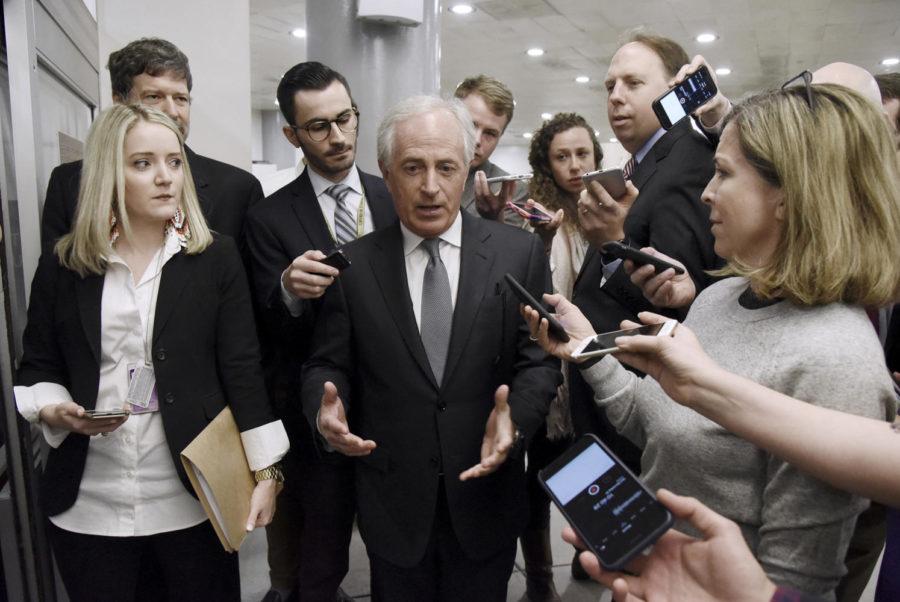Headlines flashing over cable news networks last week might have given you 2017 deja vu.
Last January, it was President Donald Trump’s nomination of then-Kansas Republican Rep. Mike Pompeo for the position of CIA director. Eyeing Pompeo’s ambivalence on civil rights issues like the use of torture and domestic mass surveillance, most Senate Democrats — with the notable addition of Kentucky Republican Sen. Rand Paul — voted against the nomination but ultimately failed to block Trump’s nominee from taking office.
The next time Pompeo came to the public’s attention, the only difference was the post he’d been named to. After firing Rex Tillerson via tweet last week, Trump once again tapped Pompeo to move up, this time to secretary of state. And once again, Paul loudly announced his opposition to both Pompeo and Gina Haspel, his proposed replacement at the CIA. Haspel has worked with the CIA for decades and was a central player in several torture scandals in the agency during the early 2000s.
“We’re not simply talking about a run-of-the-mill CIA agent here. Haspel was someone in a position of power who presided over practices that epitomized the abuse of that power,” Paul wrote in a column for Fox News last week. “Unfortunately, current CIA Director Mike Pompeo has also defended such actions in the past.”
Paul’s reluctance to support nominees like Pompeo and Haspel to top diplomatic and national security positions is easily justifiable. And on CNN Sunday, he doubled down on promises to do “whatever it takes” to keep “people who are eager for war” out of top U.S. diplomatic posts. But while his definition of who constitutes a warmonger hits the mark, Paul seems to take a much broader approach to act strongly to block bad Trump appointees.
On the Democratic side, there’s little doubt about what needs to be done to oppose Trump’s nominees, tainted as they are by their support for torture. Not known in the past for touting outspoken opinions, Pennsylvania Democratic Sen. Bob Casey released a statement last week after the nominations were announced, calling Pompeo “the most partisan and political CIA Director in recent memory.” He also denounced Haspel and Pompeo’s support for interrogation techniques tantamount to torture.
Other Senate Democrats appear ready and willing to act as America’s conscience on the issue of support for torture at the highest levels of the country’s foreign policy brass. While a number of members of their caucus joined Trump’s party last year to confirm Pompeo initially, the sum effect of a year’s worth of diplomatic disasters under Trump’s administration should work to keep Democrats from voting for him and Haspel a second time around. In this context, a defection by any Republican senator suddenly becomes much more interesting — and Paul could provide that change.
A pledge to oppose Haspel and Pompeo for their respective nominations might help the Kentucky senator keep his public image as a political maverick. But what exactly has Rand had to give up to parade his opposition to foreign policy hawks and bureaucrats willing to cut corners on civil liberties? Last time around, Paul’s “no” vote on Pompeo’s CIA nomination didn’t cost the GOP anything at all — the nominee was handily confirmed by a 66-to-32 margin. In that context, it’s hard to see any serious repercussions coming from the party leadership.
If he wants his claims he is a principled conservative to be taken seriously, Paul needs to work much harder to keep Pompeo from the State Department. Of course, a single senator can only have so much power — but Paul should recognize just how much power he has in a Senate chamber split almost evenly between the two parties. Provided Democrats uniformly oppose Pompeo and Haspel, his single defection would force Vice President Mike Pence to cast a tie-breaking vote. Just one more Republican defection, and Paul could see what he says is his policy preference become reality.
An easy path exists for the Libertarian-leaning senator to garner votes against the president’s nominees. Sen. John McCain, R-Ariz., who voted for Pompeo for CIA director last year, has more recently appeared publicly ambivalent about continued support for him and has shown mixed feelings about Haspel’s record on torture. And while his Twitter comments on the two nominees are far from conclusive opposition, they still signal an opening for Paul to take, perhaps reflecting the potential for broader conservative opposition to Trump’s candidates.
In the age of Trump, Congressional Republicans have gained a well-deserved reputation for ineffectiveness and inaction. For every leader in the GOP who’s called Trump out on his gross moral and political failings, there’s a Republican who’s turned around and backed the president’s corrupt agenda.
Paul is right: Pompeo, Haspel and their shared record of openness toward the use of torture should represent a crisis to the American conscience. What’s left to be seen is whether he turns conscience to action.
Henry is the Opinions Editor at The Pitt News. Write to Henry at [email protected].



